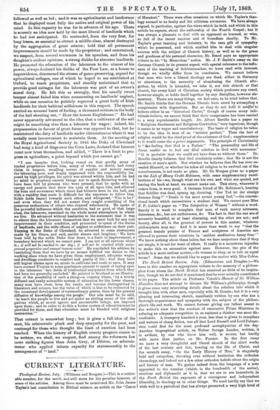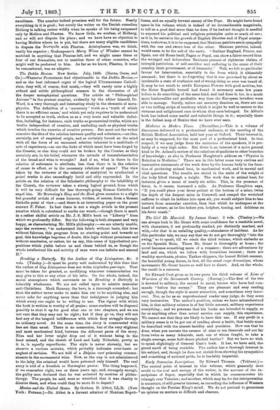The North British Review. July. (Edmonston and Douglas.)—We have in
this number an appropriate tribute to the memory of a philoso- pher from whom the .North British has received no little of its inspira- tion, though we do not find it mentioned that he ever actually contributed to its pages. The article on Professor Veitch's Memoir of Sir William' Hamilton does not attempt to discuss Sir William's philosophy, though it gives some very interesting details about the relation into which it brought him with other men, especially with M. Cousin ; but it is a very pleasing and interesting sketch, manifestly written by one who has a thorough acquaintance and sympathy with the subject of the philoso- pher's life and work. We cannot forbear giving our fullest assent to- the writer's view that the conduct of successive Prime Ministers in refusing an adequate recognition to so eminent a thinker was most dis- creditable. A trumpery hundred a year, lees than is given to compilers and writers of cheap fiction, was all that Lord Russell and Lord Palmer- ston could find for the most profound metaphysician of the day. Another biographical article, on Walter Savage Lander, written, it is evident, by one who knew him well, is severe, but hardly with more than justice, on Mr. Forster. In the first essay we have a very thoughtful and liberal sketch of the chief works of the last century and this, bearing on the life of Christ, and the seventh essay, "On the Early History of Man," is singularly bold and outspoken, throwing over without hesitation the orthodox chronology, and indeed not a few other orthodox beliefs about the origin and history of man. We gather indeed from the language of a note appended to the number (which is the hundredth of the series), cautious and diplomatic as it is, that we are to see henceforth in the North British the exponent of a courageous and independent liberality, in theology as in other things. We need hardly say that we wish well to a periodical that has always preserved a very high level of excellence. The number indeed promises well for the future. Nearly everything in it is good ; but surely the writer on the Danish comedian Heiberg is talking rather wildly when he speaks of his being surpassed only by Moller° and Plautus. We know little, we confess, of Heiberg, and so will not dispute his place; and we have have no objection to having Moliere where he is put, but there are many eligible candidates to dispute the &in-spats with Plautus. Aristophanes was, we think, vastly his superior ; Shakespeare's Merry Wives of Windsor cannot be matched in anything that Plautus left, and we might name three or four of our dramatists, not to mention those of ether countries, who might well be preferred to him. As far as we know, Plautus, it must be remembered, was an adapter.































 Previous page
Previous page